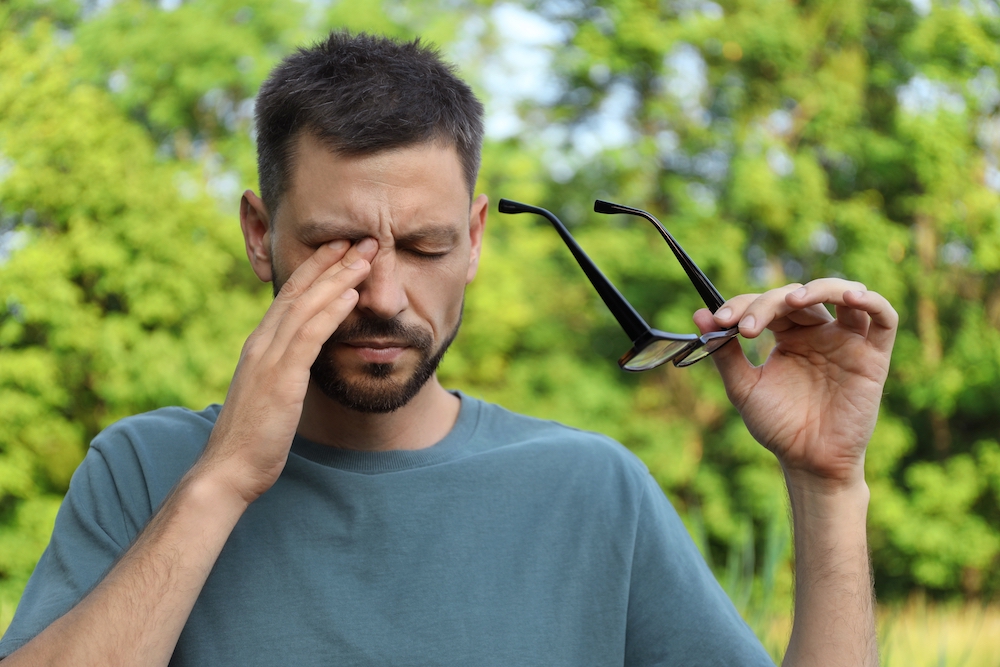
Red, itchy, and watery eyes can be symptoms of seasonal allergies or dry eye syndrome. Despite the similar symptoms, they have different underlying causes. The severity differs in individuals. Eye specialists often treat the two eye conditions as separate, but studies show they have similarities. Both conditions tend to flare up in certain seasons.
Seasonal Eye Allergies
Seasonal eye allergy, or allergic conjunctivitis, is an eye inflammation of the conjunctiva. It is the tissue that covers the eyeball and inner eyelids. The condition results from irritants and allergens, such as dust, pollen, pet dander, and mold. The condition is especially prevalent during spring and summer. Exposure to pollen and other airborne allergens causes red eyes, intense itching, watery eyes, and swollen eyelids.
Dry Eye Syndrome
Dry eye syndrome is a condition caused by a lack of adequate tears. When the eyes produce inadequate or poor-quality tears, the eye surface does not receive the required moisture. Lack of proper hydration causes severe dryness.
This can be due to age, hormonal changes, meibomian gland dysfunction, certain medications, and environmental factors. Other dry eye symptoms include grittiness, burning, the sensation of something in the eye, and watery and red eyes.
Seasonal Allergies vs. Dry Eye
Various types of eye allergies exist, but seasonal allergies are the most similar to dry eye syndrome. The main difference between seasonal allergies and dry eye is the symptoms. Allergies cause intense itching, often accompanied by watery eyes and a runny nose. Allergies also cause swelling around the eyelids, blurry vision, and ocular redness. Itchiness may be present in dry eye syndrome, but it is mild.
Link Between Allergies and Dry Eye
Studies show that seasonal allergies can cause dry eyes. Medications that treat ocular allergies can contribute to dryness by reducing tear production. Chronic allergies can lead to tissue changes that affect eyelid glands, causing the production of poor-quality tears.
On the other hand, people with dry eye syndrome have problems with tear production. Lack of proper lubrication or inadequate tear film makes it difficult to protect the eyes from allergens in the air.
Correlations Between Allergies and Dry Eye
Studies show that environmental factors trigger dry eye symptoms. Both allergies and dry eye syndrome are prevalent in certain months of the year. Seasonal allergies are common during seasons when allergens such as grass and pollen are at their peak. Dry eye cases increase during spring and winter when low humidity from indoor heating is prevalent. Dry eye prevalence is at its lowest in summer.
It can sometimes be hard to differentiate between allergies and dry eye. Both have common symptoms, such as excessive watering, dryness, blurry vision, and light sensitivity. Itchiness is the most common indicator of whether you have allergies or dry eye syndrome.
If your eyes are extremely itchy, you could be suffering from allergies. Sensitivity to allergens causes the release of histamine that causes the eyes to itch, redden, and water. For the best treatment for your eye condition, get a proper diagnosis.
For more on the link between seasonal eye allergies and dry eye syndrome, visit Envision Specialty EyeCare & Dry Eye Center at our Meridian, Idaho office. Call (208) 490-8823 to schedule an appointment today.












